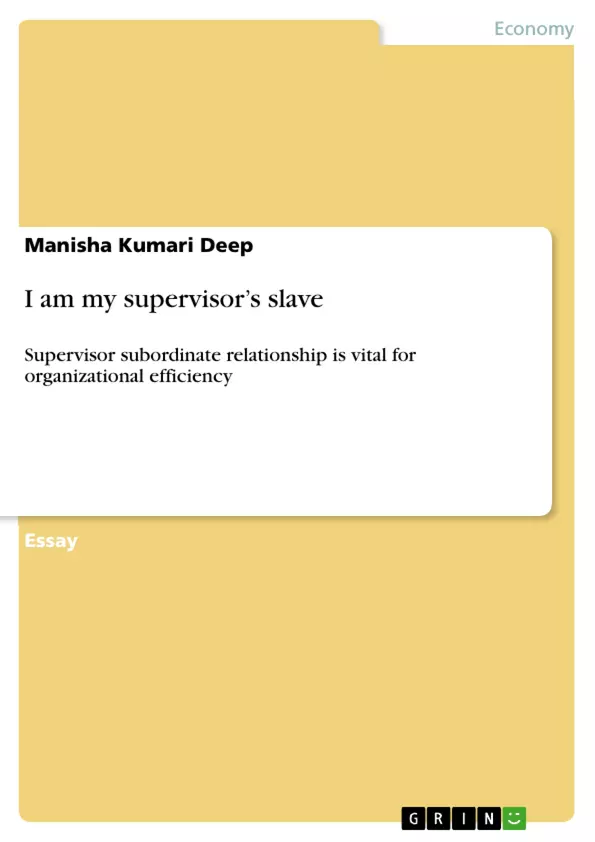This article is about the delicate relationship between the supervisor and the subordinate. While reading this article you will get a feel of what a supervisor should do and not do. Moreover the subordinates responsibilities towards their supervisor has also been given. The impact of their relationship for the organization has also been stated. You will enjoy the learning from this article.
Inhaltsverzeichnis (Table of Contents)
- Supervisor Subordinate Relationship
- Supervisor Subordinate Relationship: Communication and Role Clarity
- Supervisor Subordinate Relationship: The Role of Supervisor
- Supervisor Subordinate Relationship: Challenges and Conflict Resolution
- Supervisor Subordinate Relationship: Importance of Appraisal System
- Conclusion
Zielsetzung und Themenschwerpunkte (Objectives and Key Themes)
This text aims to provide a comprehensive analysis of the complex dynamics within supervisor-subordinate relationships in organizations. The text delves into the crucial aspects of communication, role clarity, leadership, conflict resolution, and the importance of a robust appraisal system for both supervisors and subordinates.
- The impact of effective communication on supervisor-subordinate relationships and organizational performance.
- The multifaceted roles of a supervisor in fostering a positive and productive work environment.
- Addressing challenges and conflicts that arise in supervisor-subordinate relationships and exploring strategies for resolution.
- The significance of appraisal systems for both supervisors and subordinates in promoting individual and organizational growth.
- The ethical considerations surrounding workplace relationships, particularly romantic relationships between supervisors and subordinates.
Zusammenfassung der Kapitel (Chapter Summaries)
The initial chapter sets the stage by examining the supervisor-subordinate relationship, highlighting its importance in the context of organizational socialization, communication, and performance. The text emphasizes the need for effective communication and the crucial role of a supervisor in guiding and motivating subordinates.
The second chapter deepens the discussion by delving into the specific areas of communication in supervisor-subordinate relationships, focusing on areas such as providing clear instructions, offering constructive feedback, and encouraging subordinate participation in decision-making processes.
The third chapter explores the various roles a supervisor plays in an organization, including manager, leader, planner, educator, coach, and counselor. It emphasizes the importance of a supervisor's ability to effectively manage and motivate subordinates while fostering a positive and supportive work environment.
The fourth chapter addresses the challenges and conflicts that can arise in supervisor-subordinate relationships. It highlights the significance of open communication, conflict resolution strategies, and the importance of ethical considerations, particularly regarding workplace relationships.
The fifth chapter delves into the importance of a comprehensive appraisal system that includes assessments of both supervisors and subordinates. It underscores the benefits of such a system in promoting individual and organizational growth, identifying areas for improvement, and fostering a more positive and productive work environment.
Schlüsselwörter (Keywords)
The central themes of this text are supervisor-subordinate relationships, effective communication, leadership, conflict resolution, ethical considerations, and the significance of appraisal systems. Key concepts include organizational socialization, communication strategies, supervisor roles, workplace conflict, and the importance of accountability in organizational success.
Frequently Asked Questions: Supervisor-Subordinate Relationship
What defines a healthy supervisor-subordinate relationship?
A healthy relationship is defined by effective communication, role clarity, mutual respect, and constructive feedback mechanisms within the organization.
What are the primary roles of a supervisor?
A supervisor acts as a manager, leader, planner, educator, coach, and counselor to foster a productive work environment.
How can communication improve the workplace?
Effective communication ensures clear instructions, encourages subordinate participation in decision-making, and helps in conflict resolution.
Why is an appraisal system important?
Appraisal systems promote individual and organizational growth by identifying areas for improvement and fostering accountability for both supervisors and subordinates.
What ethical considerations exist regarding workplace relationships?
Organizations must address challenges like romantic relationships between supervisors and subordinates to maintain professionalism and avoid conflicts of interest.
- Quote paper
- Manisha Kumari Deep (Author), 2012, I am my supervisor’s slave, Munich, GRIN Verlag, https://www.grin.com/document/200850



